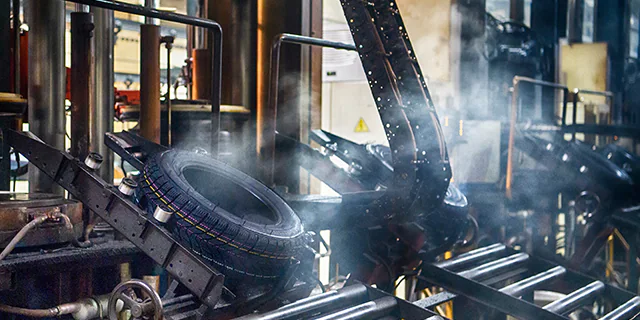Table of Contents
Introduction
In the tire manufacturing industry, ensuring the quality and performance of tires is of utmost importance. One crucial aspect of tire production is the use of nitrogen gas for inflation. PSA (Pressure Swing Adsorption) nitrogen technology has become increasingly popular due to its numerous advantages over traditional methods.
In this comprehensive guide, we will delve into the topic of PSA nitrogen in the tire manufacturing industry, exploring its working principles, benefits, applications, and frequently asked questions. This guide aims to help tire industry professionals understand the PSA nitrogen generation process and make informed decisions regarding its implementation.
What is PSA Nitrogen?
PSA nitrogen refers to high purity nitrogen gas produced through Pressure Swing Adsorption technology. It involves separating nitrogen from compressed air using carbon molecular sieve (CMS) beds that preferentially adsorb oxygen, moisture, and other gases.
Purity Levels
Typical purity levels of PSA nitrogen used in the tire industry range from 95% to 99.999%. The desired purity depends on the specific manufacturing process and tire performance requirements.
Production Methods
Besides PSA, nitrogen can also be produced through cryogenic distillation and membrane separation. However, PSA nitrogen offers greater flexibility and cost benefits for most tire manufacturing applications.
PSA Technology Overview
PSA utilizes a specialized CMS material to selectively adsorb oxygen and generate consistent purity nitrogen in an efficient, low-cost system designed for on-site gas generation.
How Does PSA Nitrogen Generation Work?
PSA nitrogen generation involves four main steps:
Air Compression
Ambient air is drawn into an inlet and compressed to the required pressure using rotary screw or reciprocating compressors. This increases the air pressure and concentration.
Filtration
The compressed air passes through filters that remove any particulates, moisture, and hydrocarbon contaminants. This prevents fouling of the CMS beds.
Separation
The filtered, pressurized air enters the CMS beds where nitrogen is preferentially allowed to pass through while oxygen and trace gases are adsorbed.
Purification
A final stage of filtration ensures the purity level meets specifications before the nitrogen gas exits the generator. Purity is monitored in real-time.
This PSA cycle continuously repeats, providing a reliable supply of purified nitrogen gas on-demand for tire manufacturing processes.
Benefits of PSA Nitrogen in Tire Manufacturing
There are several important benefits that PSA nitrogen gas provides to tire manufacturing:
Chemical Inertness
The inert properties of nitrogen prevent oxidation and degradation of rubber compounds, improving product durability.
Consistent Purity
PSA systems allow precise control over nitrogen purity, ensuring consistency regardless of flow rate changes.
Control and Flexibility
Nitrogen purity and flow rates can be customized to adapt to new formulations or processes. PSA generators allow in-house control.
Cost Efficiency
By generating nitrogen on-site, logistic costs and cylinder rental expenses are avoided, reducing overall costs.
Environmental Friendliness
PSA technology has a lower carbon footprint compared to delivered liquid or high-pressure nitrogen.
Applications of PSA Nitrogen in the Tire Industry
PSA nitrogen has two major applications in tire manufacturing:
Tire Inflation
Inflating tires with PSA nitrogen improves safety, longevity, fuel efficiency, and performance – key requirements in modern high-performance tire designs.
Manufacturing Processes
PSA nitrogen protects rubber compounds and maintains controlled atmospheres during extrusion, curing, vulcanization, tire storage, and other manufacturing processes where oxidation issues may occur.
Selecting a PSA Nitrogen Generator
When selecting a PSA nitrogen generator, key factors to consider include:
Capacity Considerations
Flow rate and purity requirements, production schedules, and future expansion plans. This helps properly size the generator.
Design Factors
Consider compressor type, CMS bed materials, piping, instrumentation, controls, and user-friendly interfaces. Look for robust, low-maintenance designs.
Additional Features
Consider built-in oxygen analyzers for purity monitoring, air dryers for moisture removal, buffer tanks for flow fluctuations, and purge saving for efficiency.
Reputable Manufacturers
Choose established PSA nitrogen companies like Absstem with proven expertise in designing tire industry-specific PSA generators.
FAQ
PSA vs Membrane Nitrogen?
PSA nitrogen offers higher purity (>95%) at lower capital and operating costs compared to membrane technology, making it better suited for most tire applications.
Required Purity Levels?
95-99% purity is commonly used for manufacturing processes while higher 99.9%+ purity may be needed for specialized inflation or composite production.
Improving Fuel Efficiency?
Nitrogen inflation provides a more stable Pressure over the tire lifespan, maintaining the optimal tire shape and reducing rolling resistance.
Safety Considerations?
PSA Generators have extensive built-in safety mechanisms. However, tire manufacturers must ensure proper gas handling and equipment operation safety procedures are in place.
Extreme Temperature Performance?
Nitrogen inflation provides more stable inflation pressure across a wide temperature range, improving performance in very high or low ambient conditions.
Economic Benefits?
PSA eliminates the logistic costs of delivered nitrogen while the productivity and quality benefits reduce scrap and downtime expenses, providing a rapid ROI.
Conclusion
PSA nitrogen offers tire manufacturers key benefits in enhancing quality, performance, safety, efficiency, and cost-effectiveness. By understanding the working principle, applications, and selection factors covered in this guide, tire industry professionals can leverage PSA technology to gain significant advantages over traditional nitrogen supply methods. With the expertise of established PSA solution providers like Absstem, manufacturers can optimize their nitrogen gas usage.
Related posts:
- PSA Nitrogen Generation for the Automotive Industry
- PSA Nitrogen in the Refrigeration Industry: An In-Depth Guide
- A Comprehensive Guide to PSA Nitrogen in the Metal Processing Industry
- PSA Oxygen in the Glass Manufacturing Industry: An Ultimate Guide
- PSA Nitrogen in Chemical Industry: A Comprehensive Guide


